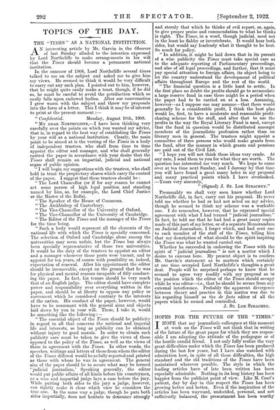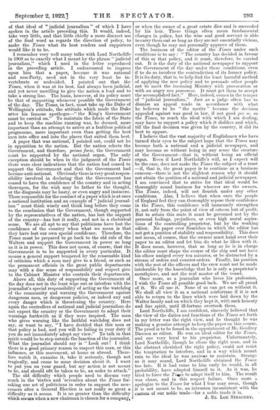HOPES FOR THE FUTURE OF THE " TIMES."
T HOPE that my journalistic colleagues at this moment 1 at work on the Times will not think that in writing of the future of the great paper for which they are respon- sible I am adopting the attitude of the pedagogue or of the hostile candid friend. I not only fully realize the very great difficulties under which the Times has been produced during the last few years, but I have also watched with admiration how, in spite of all these difficulties, the high standard and the old traditions of the Times have been maintained wherever possible. The style in which the leading articles have of late been. written has been especially admirable. Nothing in its long history has been happier from the publicist point of view. Like M. Coub's patient, day by day in this respect the Times has been growing better and better. Even if the inspiration of the articles has been wayward, undecided, personal, and not sufficiently balanced, the presentment has been worthy of that ideal of " judicial journalism " of which I have spoken in the article preceding this. It would, indeed, take very little, and that little chiefly a more discreet use of the final word as regards the direction of policy, to make the Times what its best readers and supporters would like it to be.
I remember very well many talks with Lord Northcliffe in 1908 as to exactly what I meant by the phrase " judicial journalism," which I used in the letter reproduced in the preceding article. I endeavoured to impress upon him that a paper, because it was national and non-Party, need not in the very least be in- vertebrate or undecided. I pointed out that the Times, when it was at its best, had always been judicial, and yet never unwilling to give the nation a lead and to take a strong line. The basis, however, of its policy must be that of supporting whenever possible the Government of the day. The Times, in fact, must take up the Duke of Wellington's attitude, the attitude which made the Duke utter his famous apothegm—" the King's Government must be carried on." To maintain the fabric of the State and to keep the machine running was, he deemed, more important than an attempt to arrive at a faultless political programme, more important even than getting the best men into office and into the places that suited them best.
A paper that was national, I pointed out, could not be in opposition to the nation. But the nation selects the Government, and therefore, prima facie, the Government must be supported by the national organ. The only exception should be when in the judgment of the Times there were clear indications that the nation had ceased to support the Government and that the Government had become anti-national. Obviously there is very great respon- sibility involved in declaring' that the Government has ceased to have the confidence of the country and in acting thereupon, for the wish may be father to the thought, or the diagnosis may be hasty, or even angry and insincere. Those responsible for the conduct of a paper which is at once a national institution and an example of " judicial journal- ism " must think wisely and think long before they come to the conclusion that the Government, though supported by the representatives of the nation, has lost the support of the country—has lost it really, and not in a rhetorical sense. We are all apt to say that politicians have lost the confidence of the country when what we mean is that they have lost our own special confidence. Therefore, the Times must be prepared to go back to the old rule of the Walters and support the Government in power so long as it is in power. This does not mean, of course, that the Government is to be supported in every particular. It means a general support tempered by the reasonable kind of criticism which a man may give to a friend, or such as the permanent officials in the great public departments may with a due sense of responsibility and respect give to the Cabinet Minister who controls their departments.
Above all, this duty of supporting the Government of the day does not in the least wipe out or interfere with the journalist's special responsibility of acting as the watchdog of the community and warning the Government against dangerous men, or dangerous policies, or indeed any and every danger which is threatening the country. Here again the controllers of national and judicial journalism do not expect the country or the Government to adopt their warnings forthwith as if they were inspired. The man who gives warning like the faithful watchdog does not say, or want to say, " I have decided that this man or that policy is bad, and you will be failing in your duty if you do not immediately adopt my view." To talk in that spirit would be to step outside the function of the journalist. What the journalist should say is " Look out ! I think there is a good primary reason to suspect this man, or this influence, or this movement, at home or abroad. There- fore watch it, examine it, take it seriously, though not tragically, and come to some decision about it. I want to put you on your guard, but my action is not meant to be, and should nelt be taken to be, an order to attack."
The old difficulty which people used to discuss very much in the 'sixties and 'seventies about the Times for- saking one set of politicians in order to support the new- comers after a General Election is not really so great a difficulty as it seems. It is no greater than the difficulty which occurs when a new chairman is chosen for a company, or when the owner of a great estate dies and is succeeded by his heir. These things often mean fundamental changes in policy, but the wise and good servant is able to carry them out so long as they are not essentially vicious, even though he may not personally approve of them. The business of the editor of the Times under such conditions is to say : " The country has decided in favour of this or that policy, and it must, therefore, be carried out. It is the duty of the national newspaper to support the Government of the day under these conditions, even if to do so involves the contradiction of its former policy. It is its duty, that is, to help find the least harmful method of applying the new policy and to persuade other people not to meet the incoming Ministry with provocation or with an angry non possumus. It must get them to accept the accomplished fact." Here, indeed, comes in the temper of " judicial journalism." Just as a judge often has to dismiss an appeal made in accordance with what he believes to be " the merits " because the decision appealed against was good in law, if not good per se, so the Times, to reach the ideal with which I am dealing, may have to support a policy which it dislikes and which, till the final decision was given by the country, it did its best to oppose.
I believe that the vast majority of Englishmen who have turned their eyes to the subject hope that the Times may become both a national and a judicial newspaper, and may become so without being in any sense the creature of the Government—that is, without being an official organ. Even if Lord Northcliffe's will, as I expect will be the case, does not make the Times the subject of a trust —if, that is, the great paper is to continue as a business concern—there is not the slightest reason why it should not attain the position of a national and judicial newspaper. I am convinced that to strive for that ideal would be thoroughly sound business for whoever are the owners. The Times, indeed, will not flourish under any other conditions. Also, I believe that when once the people of England feel they can thoroughly repose their confidence in the Times, this confidence will immensely strengthen it, not only from the point of view of esteem but of profit. But to attain this state it must be governed not by the personal feelings, prejudices, or even high moral aspira- tions of the controlling proprietor, but by the working editor. No paper ever flourishes in which the editor has not got a position of stability and responsibility. This does not mean, of course, that the owners must hand over their paper to an editor and let him do what he likes with it. It does mean, however, that so long as he is in charge the editor must shape the course of the ship and not have his elbow nudged every ten minutes, or be distracted by a stream of orders and counter-orders. Finally, his position with the rest of the officers and the crew must not be made intolerable by the knowledge that he is only a proprietor's mouthpiece, and not the real master of the vessel. Once more, as a journalist who loves his profession, I wish the Times all possible good luck. We are all proud of it. We all use it. None of us can get on without it. We shall all view it as a national misfortune if it is not able to return to the lines which were laid down by the Walter family and on which they kept it, with such honesty and fine spirit, until ill-fortune overtook them. Lord Northcliffe, I am confident, sincerely believed that the view of the duties and functions of the Tinzes set forth in my letter was the right view, and he thought he was making a genuine attempt to keep the paper on this course. The proof is to be found in the appointment of Mr. Geoffrey Dawson as editor. He was an ideal editor for the Times, and one very loyal to his proprietor. Unfortunately, Lord Northcliffe, though he chose the right man, and in the abstract cherished the right policy, could not resist the temptation to interfere, and in a way which meant ruin to the ideal he was anxious to maintain. Strange as it may sound, Lord Northcliffe obtained the Times too late. If it had come to him early he would, in all probability, have adapted himself to it. As it was, he tried to force the Ties to adapt itself to him. The result was chaos, and in this respect failure. Once more apologize to the Times for what I fear may seem, though it is not meant to be, an intrusion inconsistent with the custom of our noble trade—for a noble trade it is.
J. ST. LOE STEACHEY.



































 Previous page
Previous page